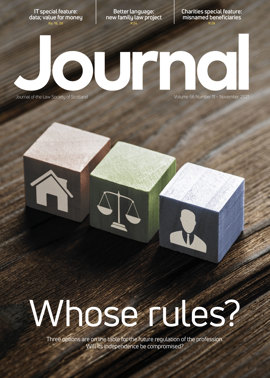ADR in family law: a portfolio approach
Important innovations are afoot in family law. The Children (Scotland) Act 2020, s 23 requires Scottish ministers to make funding available to meet the cost of ADR for private law disputes about arrangements for children. Section 24 provides for a pilot scheme to ensure that, with some exceptions, any parent seeking a court decision about their children will first have to attend a meeting to be given information about all the processes in which such a decision may be made. The pilot will be launched during 2022.
The objective is to ensure parents make informed choices as to whether arbitration, collaborative practice, mediation or family conferencing could be a better option than litigation.
This might feel like a duplication. Law Society of Scotland guidance about rule B1.9 on communication underlines that a solicitor providing advice on dispute resolution procedures should “be able to discuss and explain available options, including the advantages and disadvantages of each, to a client in such a way as to enable the client to make an informed decision as to the course of action and procedure he or she should pursue to best meet their needs and objectives, and to instruct the solicitor accordingly”.
However, research by Glasgow University into the use of separation agreements disclosed as respects ADR that “Interviews with parties revealed that it is often purely by chance that they find themselves (or their estranged spouse) being advised by someone who engages in these alternative methods”.
Portfolio modules
A powerful way to ensure your clients get full, informed and well calibrated advice about ADR is for you to train for the various processes that solicitors can conduct – mediation, collaborative practice, and arbitration.
Those undertaking training in these areas provide extremely positive feedback. The most common comment from the training for mediation and collaborative practice is “all family lawyers should do this”.
This training is provided (appropriately enough) by a collaboration between Consensus, the organisation for collaboratively trained professionals (www.consensus-scotland.com), and CALM, the association for solicitors accredited as family mediators by the Society (www.calmscotland.co.uk). It takes the form of a portfolio made up of day and half day ADR training modules plus two days of training in collaborative practice or three days for mediation.
There are modules in Theory and Practice of Negotiation and Adult Dynamics which have to be taken by any solicitor intending to train in either collaborative practice or mediation, ahead of the two or three days’ training as appropriate. For mediation training, solicitors first have to do further day and half day modules, in Advanced Negotiation, Child Development, and Children’s Reaction to Separation.
The training is delivered in this way to allow the fresh information and perspectives to be digested and integrated in advance of the specific mediation training. The mediation training can be completed within a year. The day and half day modules can be spaced out over up to three years.
From the trainers
A Portfolio trainer, psychotherapist and collaborative consultant Myra Eadie, comments: “My work involves collaborating with lawyers, financial advisers and clients to enable separating couples to understand and manage the process and emotions involved in creating a family in two homes. In the Adult Dynamics module and core collaborative training my colleague Brenda Capaldi and I provide insight into the underlying emotions, automatic interactions and games played and displayed during a crisis or change. We demonstrate how this insight can benefit clients and professionals alike.”
Kevin McKenzie, financial planner with Acumen Financial Planning, adds: “Financial affairs can often become complicated, especially when different types of pensions are involved. I am now a trainer for Consensus Scotland and keen to help expand the multi-discipline skillset here in Scotland as far as possible when couples restructure their finances, to ensure the most secure future possible for them and their children.”
Ewan Malcolm, a mediator with CALM when a partner in Drummond Miller, and now CEO of Relate London North West & Hertfordshire and CALM’s director of training, was one of the creators of the Portfolio training. He reflects: “By building on the valuable experience of conflict that family lawyers bring, we put into practice the underpinning theories of negotiation and mutual benefit fundamental to mediative approaches. The Portfolio training is also filled with relevant research and rigorous communication skills that enhance any practitioner’s toolkit.”
FLAGS, the organisation for family law arbitration by advocates or solicitors (www.flagsarb.com), provides excellent training, information and support for those interested in arbitration.
It has been increasingly recognised since the 1980s that the transition through separation represents a major reconfiguration of family relationships, legal, financial and psychological. It is a complex, three dimensional journey.
For some families, fostering problem solving will be the best route to a healthy post-separation life; for others, the protection of the court process will be a necessary element. Choosing the right process is one of the most important decisions to be made.
Details of the Portfolio training programme from Nicos Scholarios at MSMLaw (ns@msmlaw.co.uk), or Karyn Lennon at Blackadders (karyn.lennon@blackadders.co.uk)
Regulars
Perspectives
Features
Briefings
In practice
Online exclusive
In this issue
- Good legal software suppliers listen to you
- The trends that will shape law firms in 2022
- Technology won't solve everything...
- Key trends in legal tech adoption for UK law firms
- The top 4 benefits of moving to a cloud solution
- Why cyber risk management is not the same as IT support
- Business growth: finding the right package







